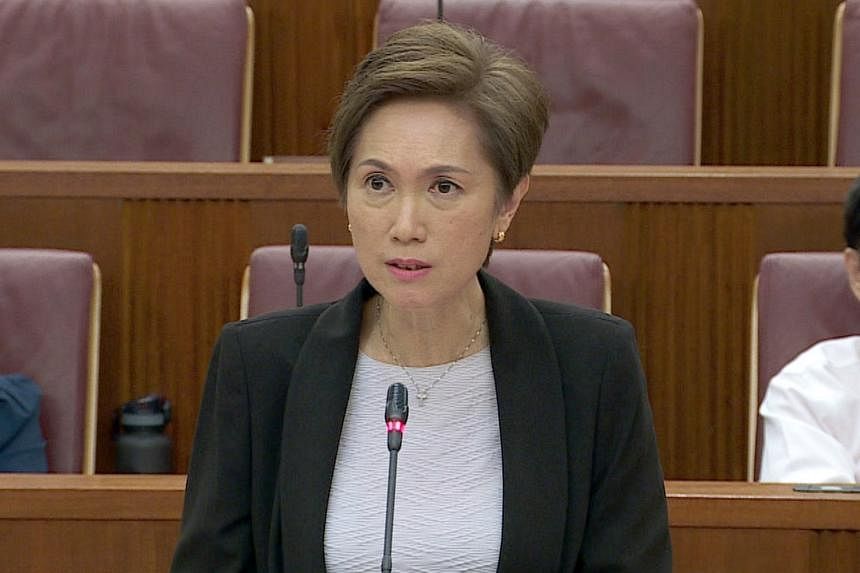SINGAPORE – Detecting illicit activity is challenging because of the many transactions Singapore handles daily as a leading international financial centre, said Second Minister for Home Affairs Josephine Teo on Tuesday.
It is the responsibility of gatekeepers – from financial institutions and corporate service providers to property agents and dealers of precious stones and metals – to do the necessary checks and flag risks, as many do, she added.
She was delivering a ministerial statement on Singapore’s anti-money laundering regime in Parliament, addressing questions from MPs about a recent money laundering case involving over $2.8 billion in cash and assets.
It is Singapore’s worst money laundering case so far.
Mrs Teo said: “As one of the leading international financial centres in the world, the daily transactions in Singapore are voluminous.
“The reality is that this sheer volume provides easy camouflage for illicit activities. Spotting a suspicious transaction among millions is challenging.
“It’s not just one needle in a haystack, but one needle in several haystacks,” she added.
So far, for that case, 10 people have been arrested and charged. Mrs Teo said there may be more arrests and seizing of assets. Several other people, including family members of those arrested, are assisting with investigations, and at least eight people are on the run.
Mrs Teo said Singapore has an anti-money laundering regime that involves collaboration across the different government ministries and agencies, and also with financial institutions and international agencies.
She said: “When we (are) open for business – and we must be – criminals will also try to exploit the same economic openness and our strong reputation for the rule of law, to launder their illicit funds, and create the appearance of legitimacy.
“In fact, all major financial hubs, not just Singapore, are vulnerable. The same characteristics that make them attractive as financial hubs also make them attractive targets for money laundering.”
Even with strict measures, it is inevitable that dirty money will still find its way to Singapore’s shores, she said. “We are under no illusion that we can always keep out dirty money,” said Mrs Teo.
She added that Singapore has to respond decisively when such activities are uncovered.
The first prong of Singapore’s anti-money laundering strategy is prevention, which involves gatekeepers in various sectors, and includes financial institutions, real estate agents, lawyers, accountants, and dealers of precious stones and metals. These gatekeepers are legally required to conduct due diligence, looking out for red flags and filing reports when they come across suspicious transactions.
For example, dealers of precious stones and metals must file cash transaction reports with the Suspicious Transaction Reporting Office (STRO) of the Commercial Affairs Department if they conduct transactions involving cash of more than $20,000.
Mrs Teo revealed that since 2021, 96 enforcement actions have been taken against dealers for failure to comply with customer due diligence and cash transaction reporting requirements.
For the recent money laundering case, The Straits Times reported in September that the Ministry of Law had sent out a notice to dealers of precious metals and stones with the names of 34 individuals who could be linked to suspicious transactions. The list included the names of the 10 accused and their family members.
The dealers were told to review transactions and business relations, and to file a report if they came across suspicious transactions involving the names on the list.
Mrs Teo added that in this money laundering case, several suspects had bought high-value assets like luxury cars, bags, liquor and ornaments that are not regulated.
She said the authorities will be looking to see if Singapore needs to extend anti-money laundering requirements to new classes of assets.
The second prong of detection relies largely on the STRO and reports filed. The STRO works with different sectors and regulators to develop a list of red flag indicators that is regularly updated to tackle emerging risk types and trends.
The office received about 43,000 reports annually between 2020 and 2022 – an average of about 150 reports every working day. Of these, 80 per cent were filed by financial institutions.
Mrs Teo said intelligence received by the STRO is extensively analysed and shared with relevant government agencies.
However, the bad actors are always looking to outdo the authorities, she added.
“All this work done by STRO, sectoral regulators and police is incredibly difficult,” she said. “It’s also not a static field, because determined money launderers are always finding new ways to hide their tracks and avoid detection.”
The third prong of Singapore’s anti-money laundering strategy is enforcement.
Mrs Teo said that from 2020 to 2022, at least 240 people have been convicted of money laundering offences. More than $1.2 billion worth of assets were seized by the police during this period, and most of the money came from scam proceeds.
She said Singapore has a robust anti-money laundering regime, and it is held in high regard internationally.
She cited how Singapore had rendered assistance to British law enforcement agencies for a case involving former Formula One boss Bernie Ecclestone.
In that case, the Monetary Authority of Singapore, police and Attorney-General’s Chambers worked closely with the British authorities on their investigation, proactively sharing information with their British counterparts to help them develop their case.
Mrs Teo concluded her statement by saying that the recent money laundering case showed that Singapore’s anti-money laundering regime works.
“This case is a reminder that even the most stringent preventive measures can be circumvented by determined criminals,” she said.
“But it also shows that our system is able to detect suspicious individuals and activities, and that when we do, we have the resolve and capabilities to track them down, and take them to task.”
Money laundering cases in Singapore
1MDB
- More than $240 million in assets seized or prohibited here.
- Three bankers convicted for failure to report suspicious transactions, fined between $10,000 and $128,000 in 2017.
- One banker convicted of money laundering, jailed for more than four years in 2017.
- 11 people issued prohibition orders ranging from three years to lifetime bans from working in Singapore’s financial sector for their gross misconduct.
Wirecard
- Three banks and an insurer in Singapore issued penalties amounting to $3.8 million for failure to perform customer due diligence.
- Seven people charged here.
- Three convicted of offences including money laundering.
Overseas cases
Bitfinex hack
- In February 2022, the US Department of Justice seized more than US$3.5 billion (S$4.8 billion) linked to cryptocurrency stolen from a 2016 hack of Bitfinex, a cryptocurrency exchange registered in the British Virgin Islands.
Illicit deals in Hong Kong
- In January 2023, Hong Kong Customs arrested nine people suspected of 7,600 illicit deals involving over HK$6 billion (S$1 billion).
- They had operated multiple bank accounts for illegal transactions.
Australian syndicate
- In February 2023, the Australian Federal Police charged nine members of an international money laundering syndicate.
- More than A$150 million (S$130 million) in assets seized.
- The syndicate had enabled multiple transnational organised crime groups to launder funds derived from criminal activities.
This story has been edited for clarity.


